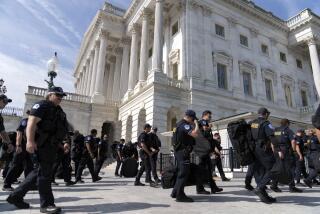No Palestinians Show Up; Shultz Chides Them
- Share via
JERUSALEM — Secretary of State George P. Shultz, standing under orange and lemon trees in the courtyard of a hotel favored by Arab activists, chided Palestinians for missing the chance to take “small steps toward peace” Friday night, when they refused his invitation to talk.
“Opportunity knocks loudly on your door,” Shultz said in a statement directed at the 15 Palestinian leaders who had rebuffed his call for a meeting. “We have a workable plan, and we are ready to commit our efforts to it.”
As Shultz spoke, Israel was recording its worst day of violence in three weeks, with four Palestinians killed and dozens more wounded.
Shultz arrived at the American Colony hotel in predominantly Arab East Jerusalem precisely at 7 p.m., the hour for which the Palestinians had been invited to discuss the latest U.S. peace initiative, even though he knew that none of them would attend.
Hundreds of Reporters
Instead of the absent Palestinians, Shultz read his statement to several hundred journalists who had been alerted by U.S. officials.
Several of the invited Palestinians, hand-picked by the U.S. Embassy because they are considered moderates, said they refused to attend because the meeting was not sanctioned by the Palestine Liberation Organization. The PLO is known to have exerted strong pressure against attendance.
“Even small steps toward peace can be significant in moving beyond mistrust and hatred,” Shultz said, apparently in answer to Arab complaints that the proposed meeting stopped short of Palestinian demands for the United States to end its refusal to deal with the PLO.
“If he wants to talk to us, he must talk to our representatives,” a West Bank activist said. “I can’t say to him that your President is not Reagan but someone else.”
Shultz chose the East Jerusalem hotel--instead of the Hilton in West Jerusalem where he is staying--as a gesture toward the Palestinians. The hotel, a favorite for visiting journalists, is also used by Arab leaders.
Shultz’s meetings earlier in the day with the three top leaders of Israel’s coalition government produced a much warmer atmosphere. But the secretary seemed to make very little progress in his effort to sell a new U.S. peace package to the Israeli leaders.
Shultz met separately with Prime Minister Yitzhak Shamir, Foreign Minister Shimon Peres and Defense Minister Yitzhak Rabin, the frequently feuding leaders of Israel’s national unity government. U.S. officials concede that Shultz’s task includes trying to reconcile differences among Israeli leaders as well as between Israel and its Arab adversaries.
Shultz and his aides declined to talk about the meetings, but Israeli officials said their positions remain unchanged.
A Qualified Welcome
“The fact that Secretary Shultz came, I welcome,” a senior defense official said. “That doesn’t mean I am going to budge one inch on what I thought before (the meeting) about what should be the solution.”
A senior official with close links to Shamir quoted the prime minister as saying that Israel is not willing to accelerate the pace outlined by the 9-year-old Camp David accords for limited self-rule for Palestinian residents of the West Bank and Gaza Strip.
The new U.S. plan calls for negotiations over the final status of the occupied territories to begin before the end of this year. It proposes limited self-rule as an interim step during the negotiations. By contrast, the Camp David formula called for five years of limited autonomy with final negotiations to begin after three years.
Senior advisers on both sides attended Shultz’s meetings with Peres and Rabin but the secretary met alone with Shamir. Israeli journalists speculated that Shamir may have demanded the private meeting because he intended to show new flexibility and did not want his hard-line associates to know about it. But there is no way of knowing that this was the case.
No Formal Plan Presented
A senior adviser to Shamir said later that the prime minister did most of the talking and that Shultz “did not put forward formally any plan.”
“There was not a trace of either pressure or trying to influence the process of (Israeli) decision making,” the adviser said.
Talking to reporters on the flight from Washington, Shultz had said he was bringing a package proposal that was carefully balanced to contain something for all sides. He said he hopes to persuade leaders in Israel, Jordan, Syria and Egypt to accept the plan without trying to change it.
Other Meetings Scheduled
Shultz was scheduled to confer with officials in Jordan and Syria today and to visit Egypt on Sunday. He plans to return each night to his hotel in Jerusalem. Arab leaders have said that Shultz’s failure to spend the night in the Arab capitals is symbolically unfortunate, reinforcing suspicions that the United States favors Israel.
Israeli officials said that Shamir and Rabin both told Shultz that Israel will not change its basic policies as a result of the Palestinian uprising on the West Bank and Gaza Strip.
“It is true that the unrest has been going on for 2 1/2 months and we have not yet found an adequate answer to it,” an official close to the prime minister said. “But we think it would be of the utmost danger to tie efforts to find an answer to the unrest to the peace process.”
He said Israel must show that it cannot be intimidated by stones.
More to Read
Sign up for Essential California
The most important California stories and recommendations in your inbox every morning.
You may occasionally receive promotional content from the Los Angeles Times.













